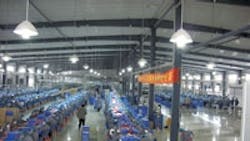China has been described by some experts as the "Wild West" of manufacturing. Among the pundits' criticism of Chinese manufacturing is lax security oversight. When U.S. companies own and operate manufacturing operations overseas, the responsibility rests with them to ensure the safety and security of their products. For New York contract manufacturer Coda Resources Ltd., security becomes more challenging at plants that are wholly owned by the company.
"Obviously, the problem you have is you don't have a Chinese partner who is overseeing it and watching it, and from 9,000 miles away it becomes a challenge to secure the facility and to know what's going in and what's going out both from a product standpoint and from a technology and an R&D standpoint," says Hillel Tropper, Coda's executive vice president. "You want to make sure your products and your trade secrets are staying."
So far, the $40 million family-owned business has survived in China without any security issues while operating in what Tropper calls an "American industrial complex." The company produces plastic injection-molded parts for the health and oral-care industries in separate buildings all located within one campus.
By keeping all production in one complex, Coda can ensure nobody enters or leaves the site without passing through a front gate. But the key element to securing the facilities is identifying people the company trusts, Tropper says. Coda does this by making as many as 30 visits to China each year to personally interview managerial candidates. In some cases, the company hires outside firms to perform background checks since obtaining records can be more difficult, he says. Coda also has two American managers based at an R&D facility in China who make several trips to the plant to monitor the operations.
Another safeguard undertaken by the company is limiting the amount of access new employees have within the facility. "We do our best to do as thorough background checks as we can. Is it foolproof? No, it's not foolproof, which is why you don't hand over the keys to the factory immediately after hiring someone," Tropper says. "They have to earn our trust."
See Also
About the Author
Jonathan Katz
Former Managing Editor
Former Managing Editor Jon Katz covered leadership and strategy, tackling subjects such as lean manufacturing leadership, strategy development and deployment, corporate culture, corporate social responsibility, and growth strategies. As well, he provided news and analysis of successful companies in the chemical and energy industries, including oil and gas, renewable and alternative.
Jon worked as an intern for IndustryWeek before serving as a reporter for The Morning Journal and then as an associate editor for Penton Media’s Supply Chain Technology News.
Jon received his bachelor’s degree in Journalism from Kent State University and is a die-hard Cleveland sports fan.
